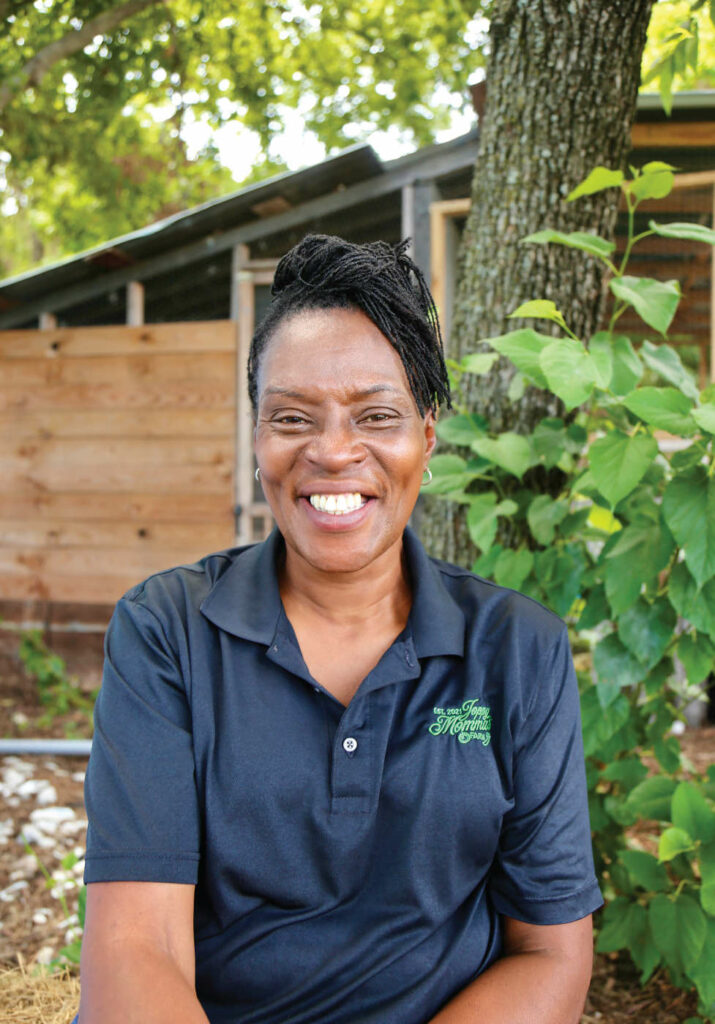
In an ancestral garden, a great-granddaughter sows hope for her community
Photos by Melinda Ortley and Terri Taylor
Arrived!” my GPS tells me. It has sent me down a craggy dirt road to an industrial yard beside an expanse of train tracks. I see dusty warehouses and gravel trucks, but no sign of my destination—Joppy Momma’s Farm—or the historic community of Joppa. Retracing my route, I discover a narrow bridge that my navigation has chosen to ignore. Halfway over, I breathe a happy sigh when a large stone marker comes into view.
“Welcome to Joppa,” it reads. “Welcome Home.” “My great-grandmother’s first house was on the other side of the tracks,” Kim High tells me when I finally arrive at the farm. “Southern Pacific bought her out. That’s when she moved over here.”
Looking around at the flourishing rows of purple hull peas, peppers, and melons, I can see that High has inherited not only her great-grandmother’s property, but her green thumb as well.
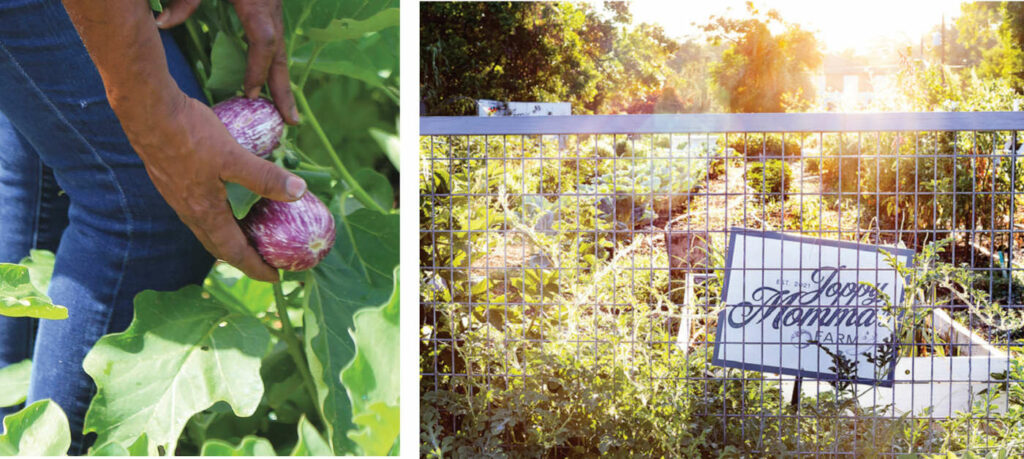
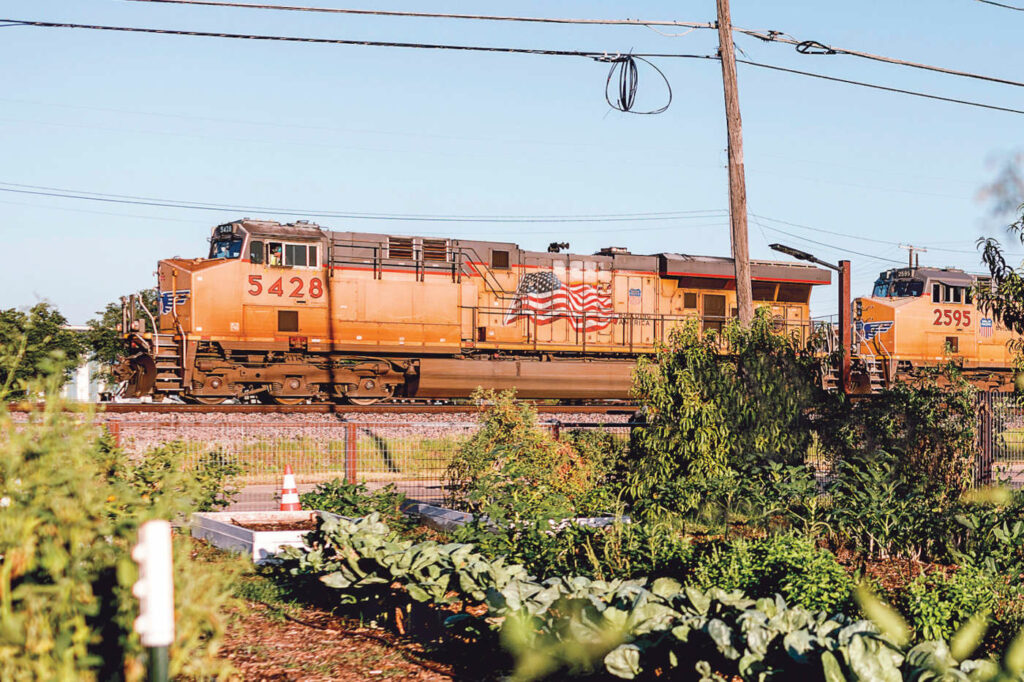
Annie Collins Horn, known to family and friends as Joppy Momma, was High’s paternal great-grandmother, and though she passed away over 50 years ago, her legacy lives on at the farm High has established in her name.
High’s family has lived in this historically significant neighborhood six miles southeast of downtown Dallas for generations. One of the original freedmen’s settlements, Joppa was founded following the Civil War by Henry Critz Hines and other formerly enslaved men and women who were seeking to rebuild their lives.
High launched the farm in 2021, and every season brings new growth, both in the fields and in the scope of the farm’s mission. On this bright August day, splashes of red zinnias and yellow marigolds dot rows filled with the last of summer’s harvest. Soon this will be replanted with spinach, Swiss chard, mustard greens, kale, turnips, beets and lettuces. Looking younger than her 60 years, High is a whirl of energy as she directs farm hand Chris Cooper, one of two former Paul Quinn College students on staff here.
“Have a seat in our breakroom,” she tells me with a laugh, pointing to two bales of hay under a shade tree. A volunteer brings over icy bottles of Topo Chico and Gatorade.
“As a little girl, I’d stand on my greatgrandmother’s back porch here and watch her harvest vegetables. ‘Sit there, Taters,’ she’d tell me.
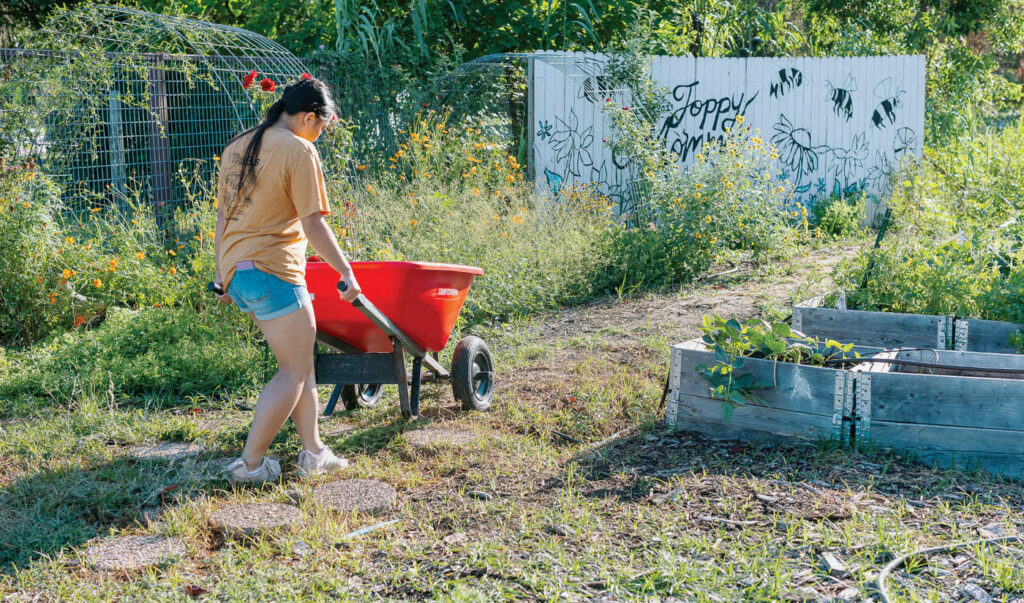
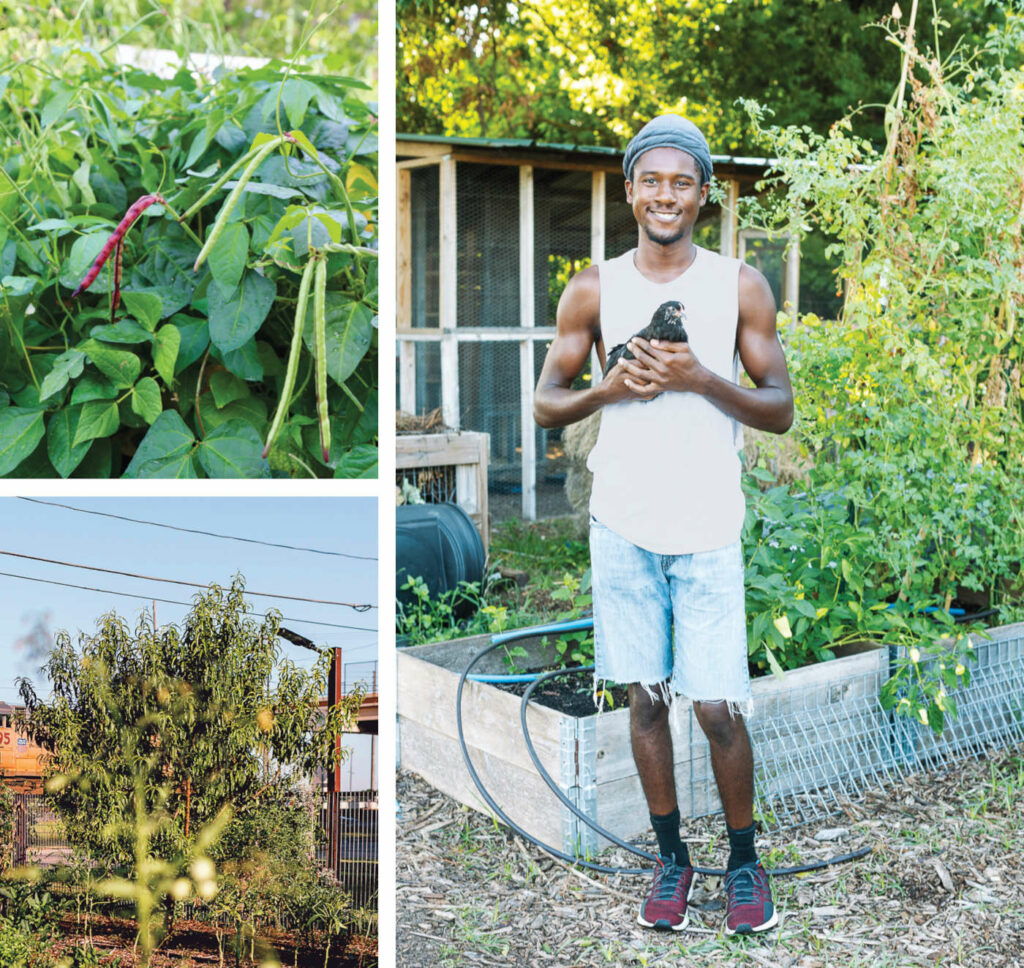
That was what she’d call me, ’cause I loved her fried potatoes.”
The sound of clucking chickens comes from a nearby coop, and in the distance, a passing freight train whistles. Close your eyes and it’s easy to imagine a time when the world moved at a slower pace. Though Joppa has grown since its establishment in 1872, it’s still a place where folks know their neighbors.
It is also a community confined by what surrounds it: an expanse of Union Pacific railroad tracks, storage yards, the Trinity River wetlands, and the Great Trinity Forest, barriers that are remnants of a system meant to marginalize.
Bus stops are miles away, and the lack of accessible grocery stores and medical facilities in this sector makes it diffcult for residents to maintain their health. Joppa has been deemed a food desert by the USDA and those who live here have a life expectancy that is far lower than certain other areas of Dallas, according to Dallas County.
High thought she was immune to such a fate until she was diagnosed with Type 2 Diabetes, a disease with both genetic and lifestyle components that has plagued her family. Despite her keeping weight in check and maintaining what she thought were healthy habits, the disease found her. The devastating diagnosis sent her searching for answers, not only for herself but for her community.
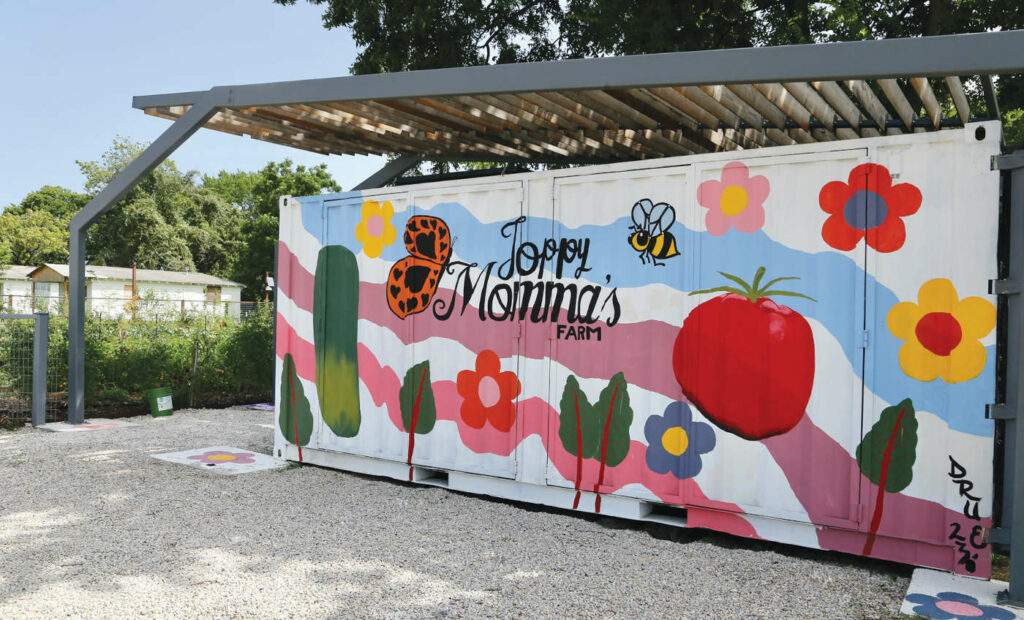
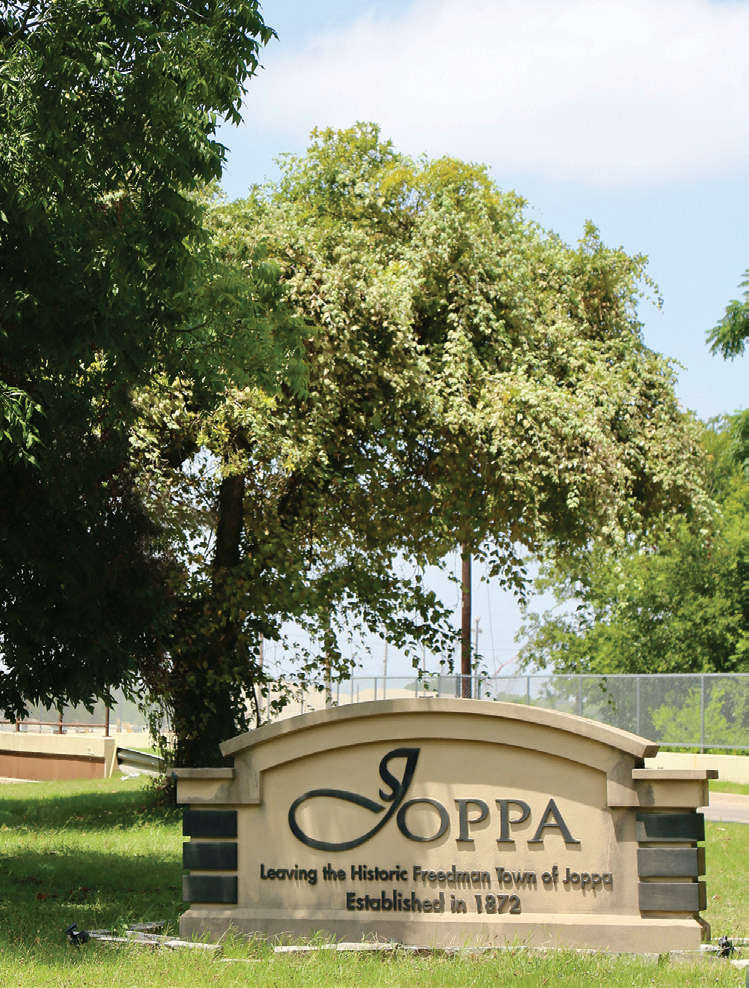
“When you think that you’re sick, you want to go into hiding, but there is an essential need for every person to get fresh air. And sunshine,” she says, raising her hands to the sky.
In hindsight, her life needed an overhaul. For 31 years she’d worked as an insurance claims agent, sitting eight hours a day in an airless cubicle. She had four kids to feed and as the work got more stressful, she became sicker.
“I left my job on a prayer. Not really knowing what came next. I trusted God with my life, and I haven’t missed a beat. Or a meal,” she says.
A visit to Daron Babcock, founder of Bonton Farms, helped her form a life plan that is still unfolding.
“At the time, Bonton wasn’t even a farm,” says High, but Babock had a vision to build bridges and bring opportunity to South Dallas. High accepted a job there and began to learn the ropes of farm management.
“It was an adjustment,” she says with a smile. “I was a girly girl with perfect nails.” Today, Bonton Farms has grown to include an eatery, a coffee shop, and a market stand, all of which have brought jobs, fresh food, and promise to the under-served neighborhood that surrounds it. This is exactly what High envisions for her own micro-community, just a few miles away.
High has the determination and experience to make it happen. In addition to her five years at Bonton Farms, she served as farm director for two years at Paul Quinn College’s We Over Me Farm, growing healthy food in another Dallas area with food insecurities. Besides her work in Joppa, she is also currently serving as farm director of the Liberty Street Garden, teaching gardening to young women who have been victims of sex trafficking.
Plans are underway to begin fundraising for the farm’s expansion. High has assembled a board and has her eye on adjacent properties—a vacant lot and a house that’s been uninhabited for years.
Students from University of Texas at Arlington’s Architecture School have already devised an innovative group of structures. For now, repurposed shipping containers serve as the farm office and farmers market stand. Using reclaimed wood, the students created an outdoor pavilion with sleek design elements inspired by the area’s shotgun-style houses.
High’s bold efforts to expand and bring change underscores the ties that bind her to her greatgrandmother. “Her garden was the biggest one around,” an elderly neighbor recently told High, who beams when she retells the story, proud that the old-timers still remember.
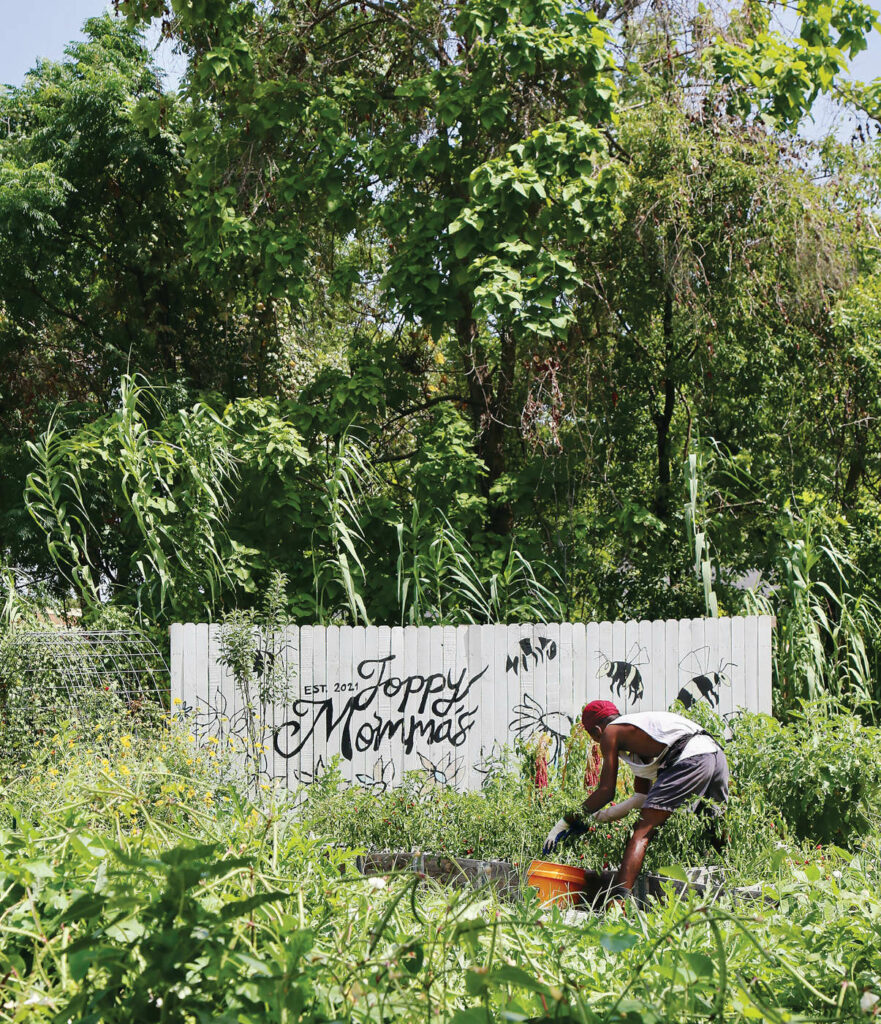
Her Joppy Momma was known for her willingness to help those in need, like the men riding the rails in search of work. Back in the day, they were called hobos, High tells me.
“We’d be sitting in the front yard, and she’d be feeding these people off the freight trains. Didn’t matter whether they were white, brown or black, she’d bring out peas, greens, whatever she’d cooked that day.”
High also embraces the mission of sharing the farm’s bounty. “I want to create a space for my community to eat healthy food. I want to build a learning kitchen to teach them how to cook what the farm has to offer.”
She engages the Joppa community with events. At Thanksgiving, the farm will partner with the Oak Cliff Veggie Project for a turkey giveaway, and neighbors will be able to pick their own vegetables.
November is also National Diabetes Month, Month, and on Saturday, Nov. 9, the farm will be co-sponsoring the second annual High Strides for Diabetes 5-K and Fun Run. This year the race will take place in Fort Worth at Opal’s Farm, whose celebrated founder is the 97-year-old Opal Lee, the grandmother of Juneteenth Month.
Also diagnosed with diabetes, Ms. Lee is another firm believer in the power of healthy eating in the fight against the chronic ailments that have ravaged their community.
“I first met her when I was farm manager at Paul Quinn,” says High. “Recently, she told me that I’d inspired her to start her garden. Can you imagine that? I said, ‘Oh, no, Ms. Opal, it’s you who’s inspired me.’”
High was thrilled that one of her neighbors added chickens to his yard because of Joppy Momma’s hens. “I love my community,” High says. “I want to preserve it. To build it back up. And I won’t stop until everyone in Joppa plants a garden.”
JOPPY MOMMA’S FARM
If you want to learn more, donate, or sign up for the High Strides Fun Run, go to joppymommas.org. During North Texas Giving Day on Sept. 19, they will be listed among the local non-profits open for donations: northtexasgivingday.org /organization/Joppy-Mommas-Farm
As a kid, TERRI TAYLOR refused to eat her vegetables. Her veggie-phobia was cured in 1977 when she spent eight months working on farms in Norway and France. She studied journalism at UT-Austin and received a master’s degree in liberal arts from SMU. Her short story “Virginia” can be found in Solamente en San Miguel, an anthology celebrating the magical Mexican town of San Miguel de Allende. She has written for Edible DFW since its inaugural issue in 2009. She became the magazine’s editor in 2010 and is the editor of Edible Dallas & Fort Worth: The Cookbook.
- Terri Taylorhttps://www.edibledfw.com/author/ttaylor/
- Terri Taylorhttps://www.edibledfw.com/author/ttaylor/
- Terri Taylorhttps://www.edibledfw.com/author/ttaylor/
- Terri Taylorhttps://www.edibledfw.com/author/ttaylor/







